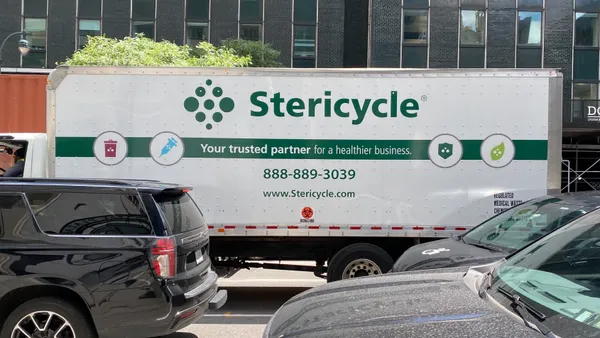Dive Brief:
- The Housatonic Resources Recovery Authority (HRRA), which serves communities in the Danbury, Connecticut area, approved a proposal to require residents to separate their glass from other single-stream recyclables.
- This will include drop-off options at nine regional transfer stations, plus the potential for additional containers for curbside collection. Oak Ridge Waste & Recycling is in talks to transport material from transfer stations, which the News-Times previously reported would go to a Strategic Materials processing facility.
- The two-year pilot program would be the first to launch in the state since the Connecticut Department of Energy and Environmental Protection (DEEP) authorized such programs, effective October 1. DEEP still has to approve the pilot before HRRA can ask residents to keep glass out of their curbside bins.
Dive Insight:
The Danbury area is among many communities across the country that have been reevaluating glass in single-stream collection — with quite a few ultimately deciding to get rid of it altogether. Broader market changes have many recyclers viewing glass as a high-maintenance, low-profit material due its potential role as a contaminant in MRFs without front-end separation equipment.
The closure of a processing facility in Massachusetts earlier this year has also limited regional options, even as other Northeast companies such as Pace Glass and Urban Mining Northeast promise new capacity is coming. Glass is also one of the materials that the state of Connecticut mandates citizens recycle and municipalities collect, adding an incentive to find solutions.
Although some recyclers don't consider glass profitable and have stopped handling it, a number in Connecticut acknowledge that glass still is a marketable commodity as long as it's free of contamination. DEEP introduced the two-year glass separation pilot programs to help recyclers obtain marketable, low-contamination glass from the public.
If DEEP approves the HRRA pilot program, the involved municipalities and recyclers are responsible for launching an educational campaign. They'll have to teach citizens that glass bottles, jars and containers must be placed in a separate bin from the other mixed recyclables, and that placing glass items such as light bulbs and mirrors in a bin contaminates the entire load. Getting residents to switch their recycling habits isn't easy, especially if they have to take material to a transfer station — and some authorities worry this change could lead to more glass getting thrown in the trash.
Further details about which haulers would collect it, and what type of tip fee discount would be applied, are still under negotiation. Because the glass separation program is a pilot, municipalities will be able to make changes and return the material to single stream if glass markets have improved after the two-year period.










